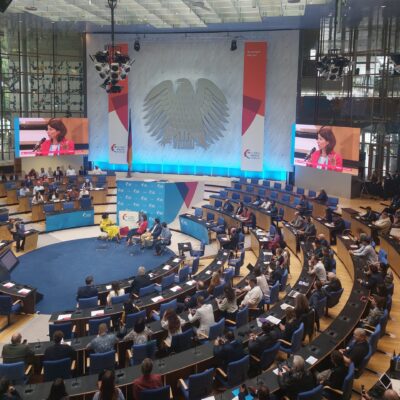How gamification can be a powerful tool in tackling disinformation in all age groups and countries
At the Global Media Form 2024, a big topic was media literacy and specifically media literacy in different generations. There, I also met Michelle Nogales, at a workshop that presented a variety of games that were designed to increase media literacy. Michelle, together with the media outlet Muy Waso she co-founded, has created a game to help combat disinformation in a fun way. The game incorporates native Bolivian animals such as the capybara, condor, or puma in a quest to destroy the “disinformation virus” by destroying the “viral bomb” or “bomba viral” that the game is named after.
The idea
The idea came up after Michelle already gave a few interactive workshops about media literacy together with her team. They quickly noticed approaching it from an interactive angle helped get the basic information and tools to the people, however they needed a more settled and structured tool to work with that would still be fun, interactive, and collaborative. Hence, the basic structure of the game, a Spanish-language tabletop game with cards, was born. A big challenge was to make the game adaptable to not only one specific disinformation issue, such as the coronavirus or elections, but rather have a structure that can work with all kinds of topics and educates the player in the different dimensions of media and information literacy such as analysis and reflection.
The target audience
The game is designed for young journalists and activists that come in close contact with diverse sources of information but might not be able to identify the disinformation from a viable news source at all times. However, it can be played by people from any knowledge level, age range or regional background. This is due to the adaptability and help the game provides when dealing with difficult words or simply by asking questions that help to kickstart the analytical thinking. When presented with a news story or other piece of content, the game will raise questions such as “Is the headline too dramatic?” or “What impact does the picture in the article have?”. Furthermore, the game is supposed to be a conversation starter rather than the only educational tool in the process of tackling disinformation. Playing the game in a workshop where other tools are also introduced or informing yourself independently after the game is the way to go.
The impact
After starting the workshops almost a year ago, the impact has already been visible in its attendees. Many report back that they have been using the tools presented in the workshop and also started thinking more critically about the news they see online. One journalist who attended the workshop is now using different websites to look at the different biases in a topic, which then in turn is helping with the reflection on their own bias. Results have been very concrete and targeted, which Michelle appreciates: “If you start with small and very punctual changes, then something bigger comes ahead”. Overall, the project aims to have people think more critically about the information and media they are consuming, which is now happening on an even larger scale, as the game is currently being translated into English and will hopefully be available to play online next year.
Featured image photo by DW Academy, Muy Waso


